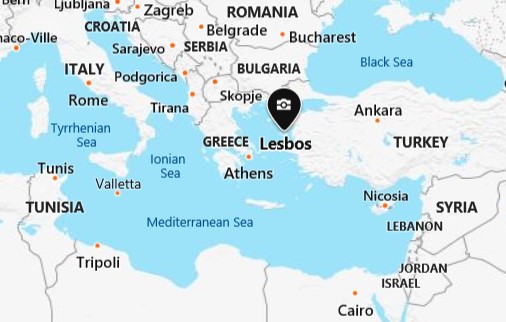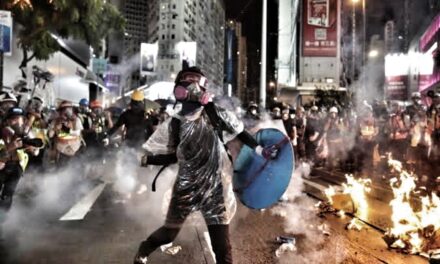LESBOS, Greece — Those looking from the windows of the Drop Center, a popular school and cafe for refugees in the Greek village of Moria, could tell the mood had turned on a warm morning in early February. Afghan mothers pushing strollers were heading back to the refugee camp, while young men were rushing in the other direction.
A morning protest by around 300 asylum seekers over their squalid living conditions had begun peacefully enough inside the camp, home to some 20,000 people from 64 different countries, including Afghanistan, Syria, Iraq and Angola. But clashes soon erupted with riot police after the group tried marching to Mytilini, the main port and capital of Lesvos. Now protesters were coming toward this small village, and its residents were mobilizing.
After a truck filled with locals stopped outside the center, continually blasting its horn through the usually serene town, workers inside hit the lights and pulled down the blinds. There was a message over loudspeakers calling for villagers to gather at the church. And it provided an opportunity for the staff to evacuate those inside two at a time.
After that day, the Drop Center was closed and staff moved elsewhere on the island. For the organization that ran the school, A Drop in the Ocean, it seemed their welcome had run out. Another NGO had rocks thrown through their windows. Later a group of local vigilantes went door-to-door looking for aid workers or refugees. “I understand that [the villagers] are tense. They live in an extreme situation. But it doesn’t excuse their behavior toward us,” said Ida Sorbye, a worker at the Drop Center.
If the Greek island of Lesvos is the frontline of Europe’s refugee crisis, Moria is a no-man’s land. The small village’s population of around 2,000 is now dwarfed by the camp of the same name up the road. As many as possible are crammed into the main facility, designed to hold only 2,800, with the rest spilling out in tents and hastily-built structures on the slopes of ancient olive groves. Numbers have exploded over the last year as new regulations require refugees to apply for asylum at their first landing place in Europe. For many that means Lesvos.
Turkey said on Thursday it would no longer restrain hundreds of thousands of asylum seekers in its territory from reaching Europe despite a deal to do so reached with the EU in 2016. That means islanders are expecting things to rapidly worsen. Thousands of refugees are now on the border of Northern Greece. The crisis poses the toughest test for Greece since a 2015 financial crisis.
The situation is worsening as crime escalates. There’s been at least two murders at the camp, and reports of daily fights and stabbings between refugees. Doctors Without Borders said that rape is also common inside the camp, as high as one rape reported a week.






Recent Comments